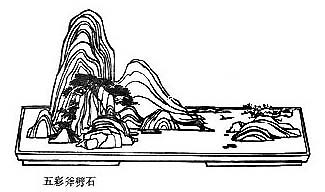Shi Jing 
 – Le Canon des Poèmes
– Le Canon des Poèmes
Le plus ancien recueil connu de poésie chinoise, plus de trois cents chansons, odes et hymnes. Tr. Legge (en) et Granet (fr, incomplète).
Shijing IV. 5. (302)
Ah ! ah ! our meritorious ancestor !
Permanent are the blessings coming from him,
Repeatedly conferred without end : –
They have come to you in this place.
The clear spirits are in our vessels,
And there is granted to us the realization of our thoughts.
There are also the well-tempered soups,
Prepared beforehand, the ingredients rightly proportioned.
By these offerings we invite his presence, without a word,
Nor is there now any contention [in any part of the service].
He will bless us with the eyebrows of longevity,
With the grey hair and wrinkled face, in unlimited degree.
With the naves of their wheels bound with leather, and their ornamented yokes,
With the eight bells at their horses' bits all tinkling,
[The princess] come and assist at the offerings.
We have received the appointment in all its greatness,
And from Heaven is our prosperity sent down,
Fruitful years of great abundance.
[Our ancestor] will come and enjoy [our offerings],
And confer [on us] happiness without limit.
May he regard our sacrifices in summer and winter,
[Thus] offered by the descendant of Tang !
Legge 302

Le Canon des Poèmes – Shi Jing IV. 5. (302) – Chinois off/on – Français/English
Alias Shijing, Shi Jing, Book of Odes, Book of Songs, Classic of Odes, Classic of
Poetry, Livre des Odes, Canon des Poèmes.
Le Canon des Poèmes, Les Entretiens, La Grande Étude, Le Juste Milieu, Les Trois Caractères, Le Livre des Mutations, De la Voie et la Vertu, 300 poèmes Tang, L'Art de la guerre, Trente-six stratagèmes
Bienvenue, aide, notes, introduction, table.
Index – Contact – Haut de page
